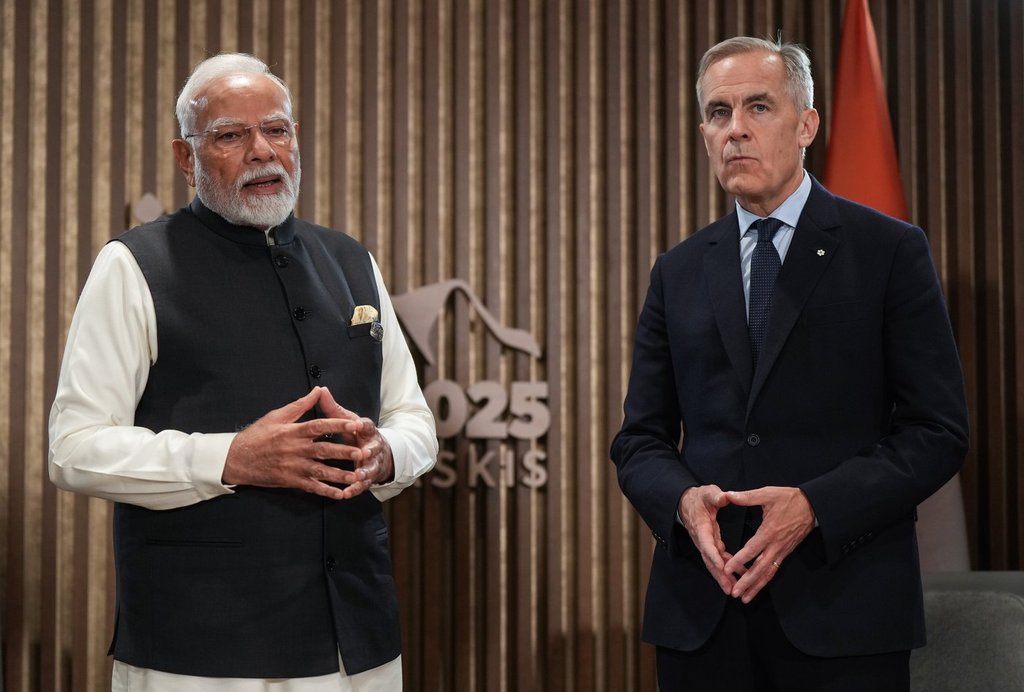Politics
Canada and India Reestablish Diplomatic Ties Following Tensions

The Government of India has agreed to readmit a full delegation of Canadian diplomats, marking a significant diplomatic step in the relationship between the two nations. This announcement was made by Canada’s Foreign Affairs Minister Anita Anand on Tuesday, following a meeting with Indian Prime Minister Narendra Modi and other senior officials in India.
The renewed dialogue has emerged after a period of heightened tensions, particularly after allegations from the Royal Canadian Mounted Police (RCMP) that the Modi administration was involved in violent acts within Canada. These allegations included claims regarding the assassination of Sikh activist Hardeep Singh Nijjar near Vancouver in 2023. In response to these serious accusations, Canada significantly reduced its diplomatic footprint in India, prompted by threats from the Indian government to strip diplomatic immunity from Canadian diplomats.
Despite the backdrop of these allegations, there were indications earlier this year that relations could improve. In June, Prime Minister Mark Carney hosted Modi at the G7 summit in Alberta, where the two leaders discussed ongoing law enforcement dialogue and security concerns. Indian media reported that both leaders were committed to “calibrated and constructive steps” aimed at restoring diplomatic stability, which included the appointment of new high commissioners to each country in August.
Anand’s recent announcement is seen as a continuation of the discussions initiated during the June meeting. This progression could lead to the restoration of the comprehensive diplomatic relationships that existed before the controversy began two years ago.
Some Canadians view this diplomatic thaw as a positive development, particularly within the business community, which identifies India as an essential market. Nonetheless, others remain cautious. The World Sikh Organization of Canada expressed deep concern over the lack of assurances regarding foreign interference and transnational repression by the Indian government.
Polling data from the Angus Reid Institute reveals a divided public opinion on the matter. Conducted in late September, the poll indicates that 51 percent of Canadians believe restoring ties with India was the correct decision. However, a larger segment, 54 percent, holds unfavorable views of India. Additionally, 60 percent of respondents suggest that Canada should approach its relationship with India cautiously, with 23 percent viewing India as a potential threat or enemy.
Shifts in public sentiment are noteworthy, especially as priorities change due to economic factors. When asked what should be prioritized in the Canada-India relationship, 52 percent of respondents favored the rule of law, while 48 percent emphasized trade opportunities. This contrasts with last year’s data, where the rule of law was prioritized by 62 percent of respondents.
The complexities of the Canada-India relationship underscore the need for continued diplomatic engagement. As Madeleine Albright, former U.S. Secretary of State, noted, addressing difficult national issues often requires dialogue with both friends and adversaries. The allegations against the Modi government are serious and merit thorough investigation. However, these issues must not hinder the vital diplomatic and commercial ties that benefit both nations.
In conclusion, Anand’s announcement is a critical step towards resolving diplomatic tensions and fostering a more stable relationship between Canada and India. Both nations must navigate these complexities while ensuring that concerns regarding foreign interference are adequately addressed.
-

 Politics4 weeks ago
Politics4 weeks agoSecwepemc First Nation Seeks Aboriginal Title Over Kamloops Area
-

 World5 months ago
World5 months agoScientists Unearth Ancient Antarctic Ice to Unlock Climate Secrets
-

 Entertainment5 months ago
Entertainment5 months agoTrump and McCormick to Announce $70 Billion Energy Investments
-

 Science5 months ago
Science5 months agoFour Astronauts Return to Earth After International Space Station Mission
-

 Lifestyle5 months ago
Lifestyle5 months agoTransLink Launches Food Truck Program to Boost Revenue in Vancouver
-

 Technology3 months ago
Technology3 months agoApple Notes Enhances Functionality with Markdown Support in macOS 26
-

 Lifestyle3 months ago
Lifestyle3 months agoManitoba’s Burger Champion Shines Again Amid Dining Innovations
-

 Top Stories2 months ago
Top Stories2 months agoUrgent Update: Fatal Crash on Highway 99 Claims Life of Pitt Meadows Man
-

 Politics4 months ago
Politics4 months agoUkrainian Tennis Star Elina Svitolina Faces Death Threats Online
-

 Sports5 months ago
Sports5 months agoSearch Underway for Missing Hunter Amid Hokkaido Bear Emergency
-

 Politics5 months ago
Politics5 months agoCarney Engages First Nations Leaders at Development Law Summit
-

 Technology5 months ago
Technology5 months agoFrosthaven Launches Early Access on July 31, 2025





















